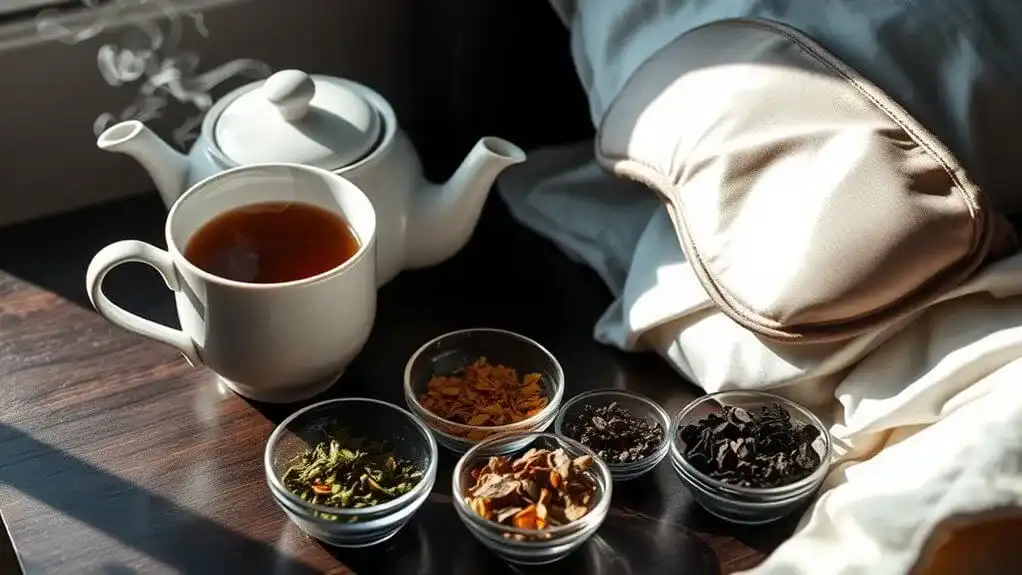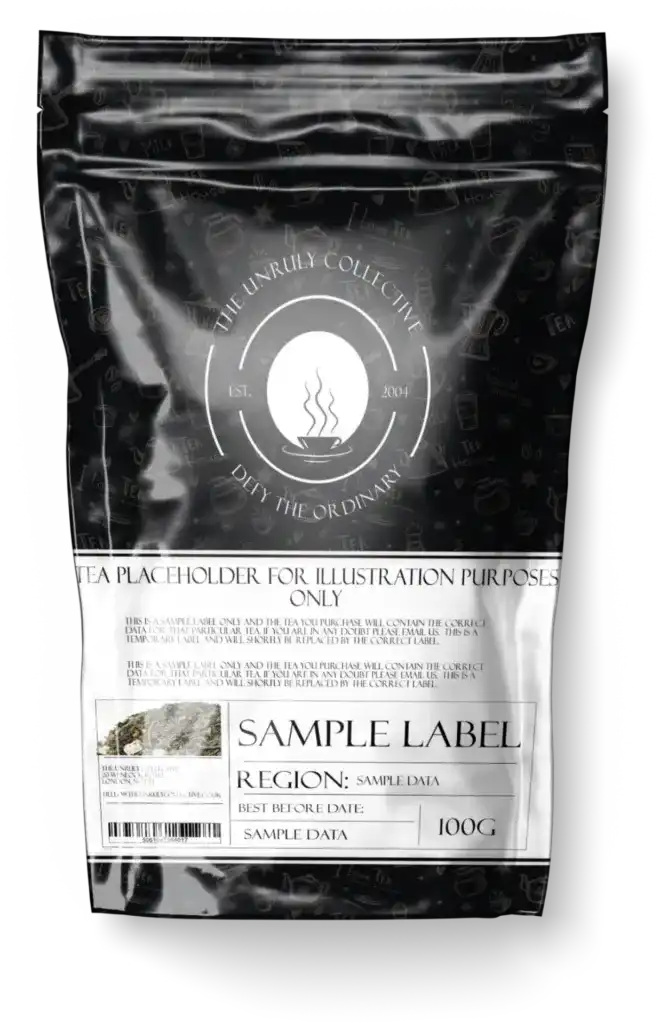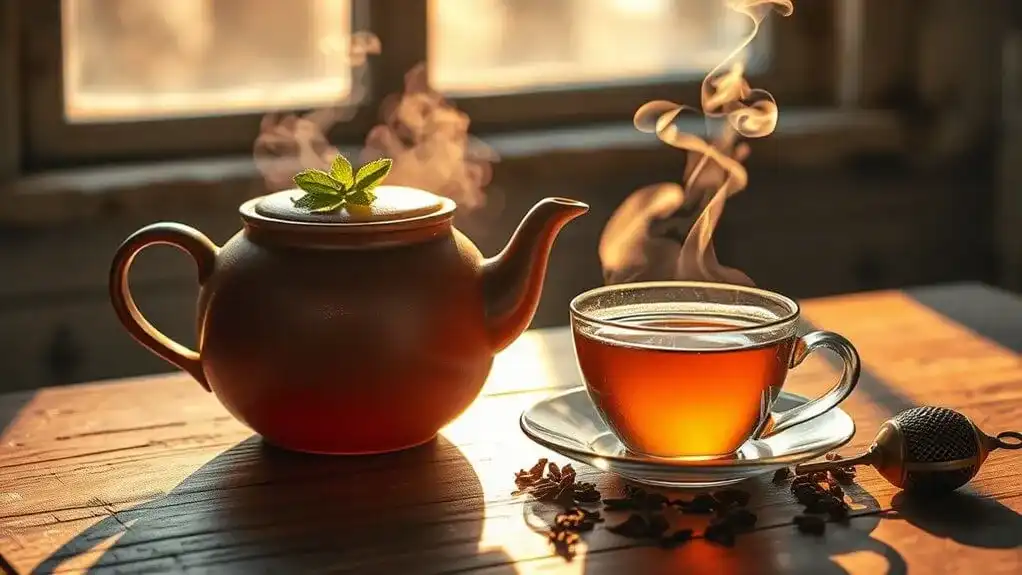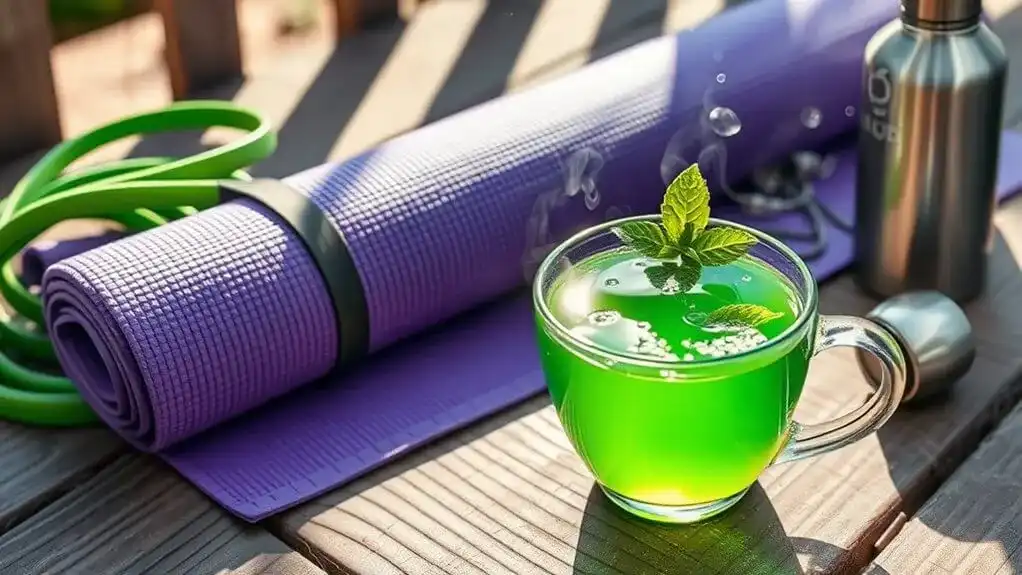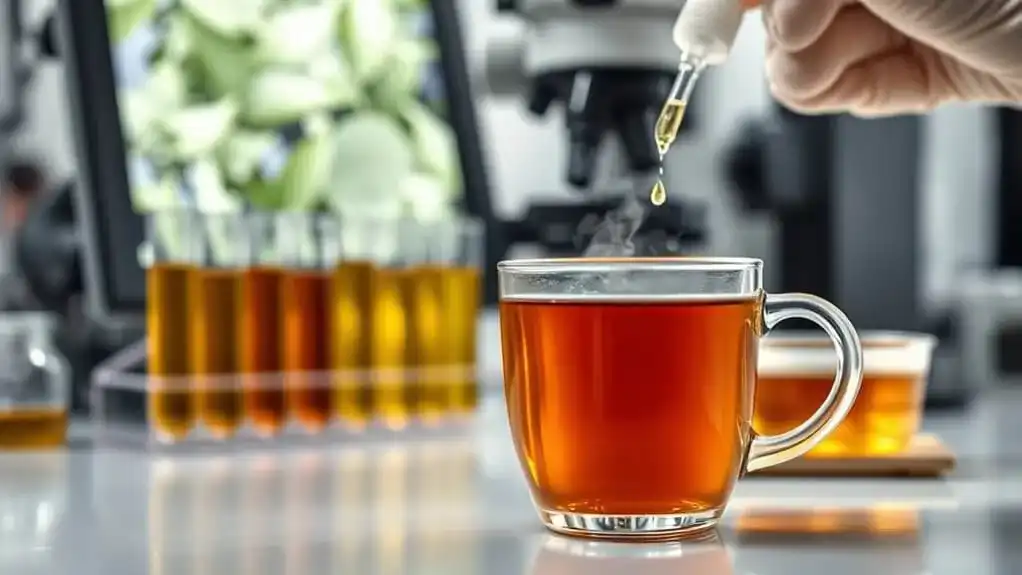Tea's impact on sleep varies considerably based on caffeine content and brewing methods. While matcha contains the highest levels (70+mg), white tea offers the lowest (15-55mg) among traditional varieties. Herbal options like chamomile and rooibos provide caffeine-free alternatives for evening consumption. Brewing time and water temperature affect caffeine extraction, with longer steeps releasing more caffeine. Understanding these variables helps tea enthusiasts make informed choices for better sleep quality.
Key Points
- Black tea contains the highest caffeine content (50-90mg per cup) among traditional teas, making it less suitable for evening consumption.
- White tea offers lower caffeine levels (15-55mg) and beneficial sleep compounds, making it a better choice for nighttime drinking.
- Steeping time directly affects caffeine content, with a one-minute steep yielding 17mg versus 47mg for five minutes.
- Herbal alternatives like chamomile, rooibos, and hibiscus provide naturally caffeine-free options with calming properties for better sleep.
- Water temperature impacts caffeine extraction, with cooler water releasing less caffeine during the brewing process.
The Science Behind Tea and Sleep Quality

While many associate tea with caffeine and alertness, research reveals that certain compounds in tea can actually enhance sleep quality. The tea benefits extend far beyond simple relaxation, as bioactive compounds like theanine and polyphenols work together to regulate sleep cycles and promote better rest. During periods of illness, sickness sleep behavior helps organisms recover more effectively. White and green teas contain lower caffeine levels, making them excellent choices for evening consumption.
Studies show that regular tea consumption, particularly over long periods, markedly improves sleep duration and quality. This is largely due to tea's unique ability to protect neural pathways and reduce oxidative stress in the brain. The compounds work through multiple mechanisms, including the regulation of neurotransmitters and the gut-brain axis. Tea polyphenols have been found to increase non-rapid-eye movement sleep, similar to the effects of mild sleep medications, while L-theanine helps counteract any potential sleep-disrupting effects of caffeine. Daily tea drinkers experience better sleep quality scores compared to non-tea drinkers, demonstrating tea's significant impact on rest patterns.
Ranking Tea Types by Caffeine Content
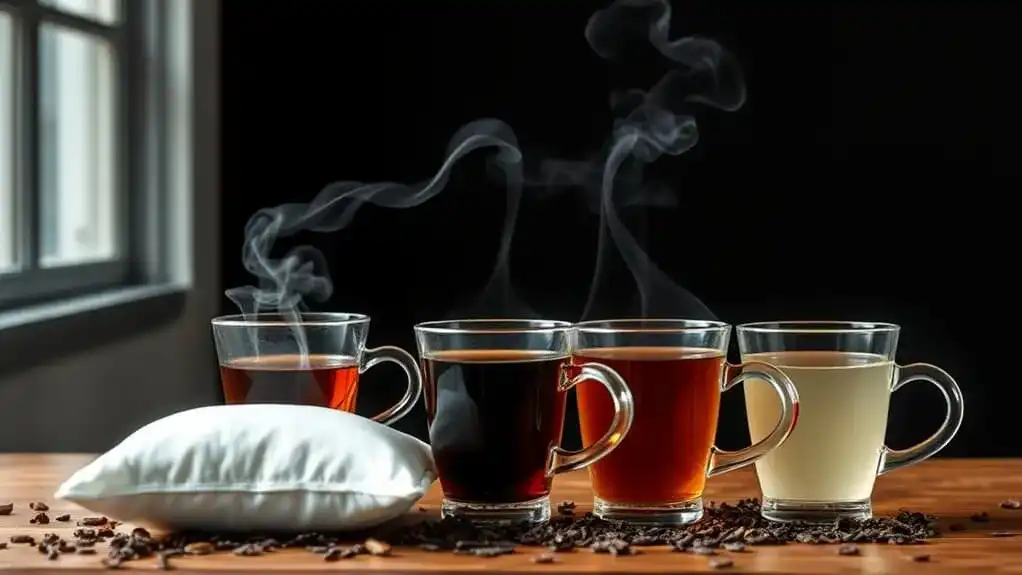
Five primary types of tea demonstrate distinct patterns in their caffeine content, ranging from white tea's modest levels to matcha's concentrated punch. When conducting a caffeine comparison across tea varieties, it's crucial to note that traditional assumptions don't always hold true. White tea isn't necessarily the lowest in caffeine, and green tea can sometimes pack more punch than black tea. Spring-harvested teas tend to contain elevated caffeine levels compared to other seasonal harvests. For those seeking alternatives, herbal blends provide caffeine-free options. The peak caffeine extraction occurs when tea is steeped for 10-minutes in hot water. These variations stem from factors like harvest timing, processing methods, and cultivation regions.
- Highest Caffeine: Matcha leads the pack due to its unique preparation method, where the entire leaf is consumed
- Mid-Range Options: Black and oolong teas typically contain 50-90mg and 30-75mg per cup, respectively
- Variable Content: White and green teas show surprising ranges (15-55mg and 20-70mg), challenging common beliefs about their caffeine levels
Best Low-Caffeine Teas for Evening Consumption

For those seeking peaceful evenings without caffeine disrupting their sleep, several tea varieties offer the perfect solution. Herbal infusions lead the way, with rooibos and hibiscus providing completely caffeine-free options with distinct calming flavors. True tea drinkers can opt for CO2 processed decaffeinated versions that contain only 4mg of caffeine per cup. These herbal infusions benefit those looking to establish relaxing bedtime rituals. The naturally caffeine-free nature of herbal teas makes them an excellent choice for anyone sensitive to stimulants.
Among traditional teas, hojicha stands out with less than 10mg of caffeine per cup, while white tea and genmaicha offer similarly low levels. The tea's unique roasting process naturally decreases its caffeine content compared to other green teas. Kukicha and karigane, made from tea stems, provide gentle alternatives with moderate caffeine content. Each of these options can support evening relaxation without compromising sleep quality.
For the most reliable caffeine-free experience, chamomile and turmeric teas deliver both soothing properties and therapeutic benefits, making them ideal choices for nighttime consumption.
How Brewing Methods Impact Caffeine Levels
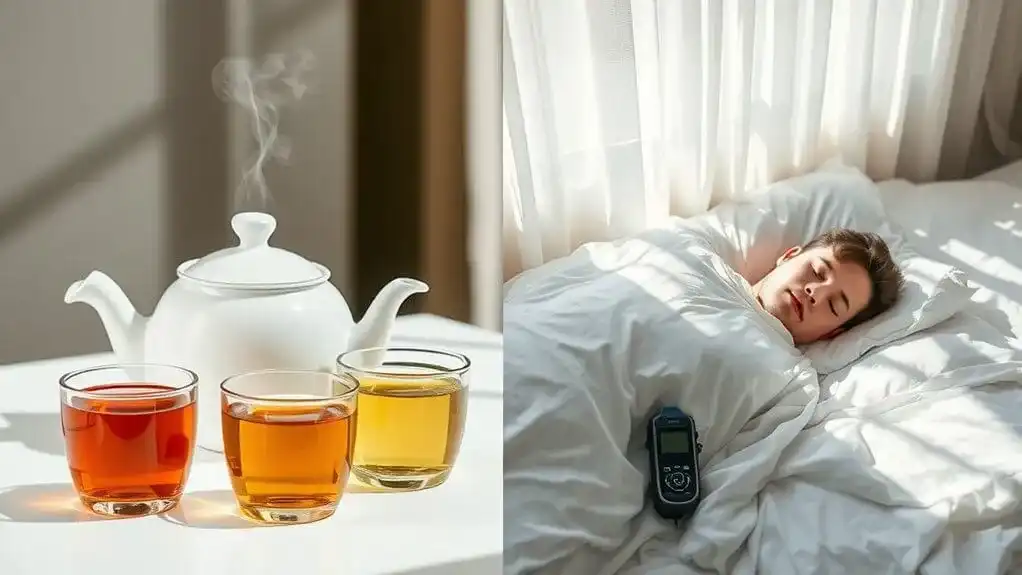
Since brewing methods greatly influence tea's caffeine content, understanding the key variables can help consumers control their caffeine intake. Different brewing techniques directly impact how much caffeine gets extracted from tea leaves, with temperature effects playing a significant role in this process. While many believe a quick rinse removes caffeine, scientific studies disprove this common myth. For optimal caffeine extraction, use boiling water for black tea and barely boiling water for green tea. Steep quality loose leaf tea longer than bagged tea since the larger leaves require more time to release their caffeine.
Hot water extracts caffeine more efficiently than cooler water, while steeping time determines the final caffeine concentration. Consider these key factors:
- A one-minute steep yields approximately 17mg of caffeine per 6 ounces
- Extending to three minutes increases caffeine to 38mg per 6 ounces
- A five-minute steep maximizes extraction at 47mg per 6 ounces
Multiple infusions of the same leaves contain progressively less caffeine, as most caffeine releases during the first steeping. This knowledge allows tea drinkers to adjust their brewing methods based on their desired caffeine intake.
Smart Tips for Nighttime Tea Selection
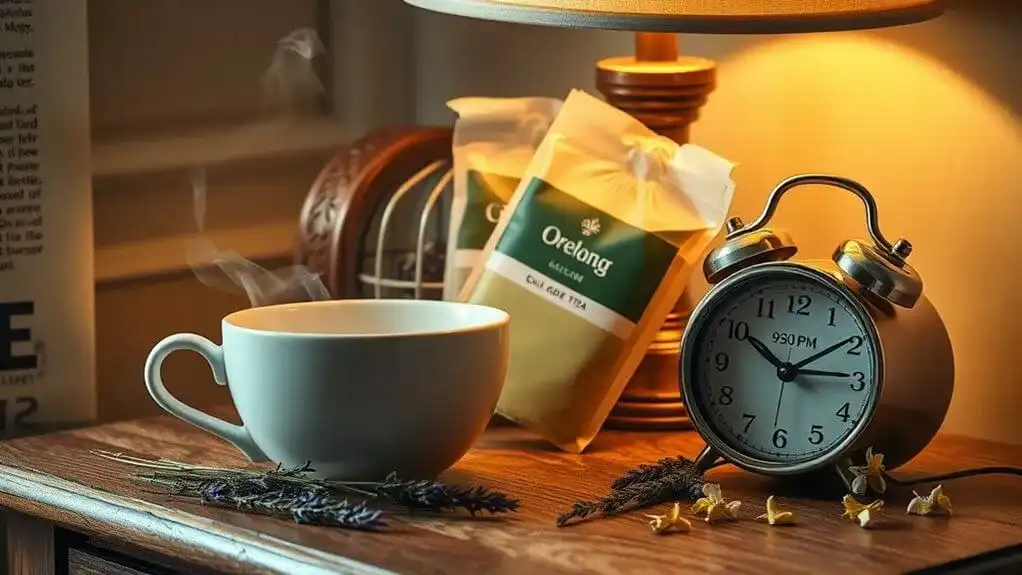
When selecting tea for nighttime consumption, understanding caffeine content becomes essential for quality sleep. White tea offers the lowest caffeine content among traditional teas, making it suitable for evening tea rituals. For those particularly sensitive to caffeine, herbal alternatives provide naturally caffeine-free options. Water temperature significantly impacts caffeine extraction during steeping.
The best approach to finding the right nighttime tea involves considering personal caffeine sensitivity and metabolism. While green tea's caffeine absorbs more slowly than black tea's, individual responses vary considerably. Oolong presents a middle-ground option with moderate caffeine levels. Tea enthusiasts should experiment with small samples to determine how different varieties affect their sleep patterns. Understanding that factors like plant genetics, growing conditions, and leaf age influence caffeine content helps in making informed choices for evening consumption. Laboratory testing shows that young buds and leaves contain higher amounts of caffeine, so avoiding teas made from these parts is advisable for evening drinking.
Conclusion
Choosing the right tea for evening enjoyment doesn't have to be a game of chance. Like a gentle lullaby, herbal and decaffeinated options pave the way for restful sleep, while understanding brewing methods and caffeine content empowers mindful choices. Whether it's chamomile's soothing embrace or a perfectly timed green tea, smart tea selection creates harmony between our love for warm beverages and our body's need for quality rest.
